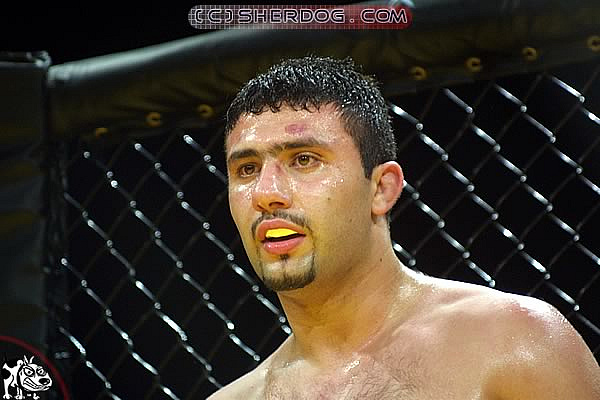Parisyan vs. Parisyan
Jake Rossen Sep 6, 2010

Karo Parisyan file photo: Jeff Sherwood | Sherdog.com
The boxer Oliver McCall once began sobbing between rounds in a bout with Lennox Lewis. In a hybrid MMA/kickboxing contest, an exhausted Bob Sapp begged his corner not to force him out for more punishment against Jerome Le Banner. Paulo Filho regarded Chael Sonnen as a nuisance neighbor rather than an opponent in a cage.
Advertisement
That’s because choosing a career in prizefighting is an emotional drain. Athletes make an appointment months in advance that will jeopardize both their health and their future. It’s like signing up for a medical procedure: The thing itself might not be so bad, but the anticipation is what wears nerves raw. And unlike most operations or phobias, there’s a fairly good chance something is going to go very, very wrong.
Most guys deal with it. Some don’t. On the surface, Karo
Parisyan had the posture and attitude of someone who was too
callused to be trumped by fear. He probably sticks his chest out
when buying a gallon of milk. Seeing him fight, I’d envy his
constitution. There’s a guy, I thought, who would never
need a Valium before getting his teeth cleaned.
But being an Armenian with a sandpaper attitude doesn’t insulate you against everything. When I worked with a writer named David Samuels to cover Parisyan’s implosion in mid-2009, Samuels came back with a laundry list of possible triggers for the panic attacks that had begun crippling Parisyan’s career. Marriage was looming. He was sick. The money wasn’t good. The pressure just builds and builds and builds. For most fighters, seeing the referee wave off their fight is like turning the nozzle and letting it all out. It has to come out.
Karo never seemed to experience that release. He started thinking death was around the corner. His blood pressure shot up. He suffered 17 attacks before fighting Thiago Alves in April 2008. Alves knocked him out. Nobody had ever done that to him. He pulled out of his next fight. Then he tested positive for painkillers. Then he pulled out of another fight, this time the day of. The UFC lost his phone number, possibly for good. He was photographed looking gaunt. He had a nothing fight in a nothing promotion and insisted his bout -- originally the co-main -- be moved up so he wouldn’t have to be trapped in a locker room for two hours with himself. He won. So that’s something.
Now Parisyan is back in the UFC and scheduled for a November bout with Dennis Hallman, a veteran who is skilled but not especially violent. He swears his rebelling thoughts are under control and that he deserves a second (fifth?) chance.
Deserving it is one thing. Being ready for it is another.
It’s easy to speak rationally when you’re months away from a fight. That creeping sense of pending doom is muted. Fight night is a different story. Most athletes get nervous, but it’s a manageable kind of sickness: a let’s-get-this-over-with vibe rather than a I-think-I’ll-lock-myself-in-this-storage-closet freeze. If you are predisposed to exhausting yourself with worry and your nervous system treats daily tasks as threats, I can think of no worse occupation than being a fighter. Having a fractured mentality before you take a risk that requires considerable focus and acuity is a dangerous and foolish thing.
There’s little doubt that he’s frustrated by his handicap. He may not be in a financial position to take his time in addressing the problem. But I would no sooner invite him back into the cage with jumbled thoughts than I would if he had a broken leg. I hope he’s offered the UFC real evidence that he’s recovering; I would hope the UFC would help facilitate treatment if he is not. Karo Parisyan is one of the toughest guys around, but that’s not going to do him much good unless he walks into the arena believing it.
Related Articles






